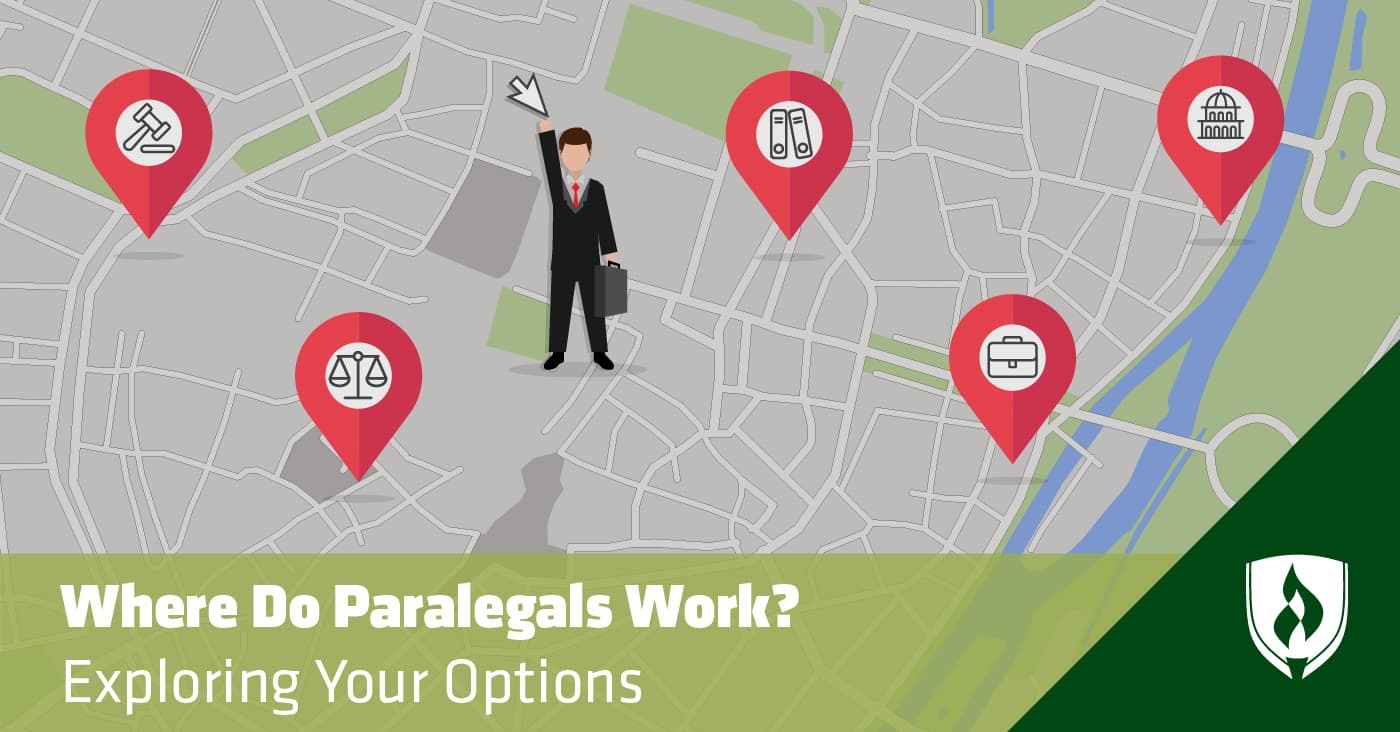
Your detail-oriented personality and interest in law make you the perfect candidate for a career as a paralegal. Though you’re not there yet, you’re starting to consider the practical aspects of a career in law. Where could you get a job as a paralegal and what would that look like? Though your first thought might lead you to a busy day in a courtroom, a paralegal’s work can cover a lot of ground—both physically and in the terms of the cases they’ll assist with. Let’s walk through the various settings and legal disciplines a paralegal may focus their work in. Also check out the different types of attorneys you might assist as a paralegal.
Where do paralegals work?
Let’s start with where paralegals will literally work. You'll typically find paralegals in office settings which can include law firms, corporate legal departments and governmental agencies. Though there are some exceptions—international law and sometimes criminal law can involve intercontinental trips or shorter trips to gather information or accompany attorneys to trials—the work of a paralegal generally takes place in a standard office environment. Beyond that, some paralegals may accompany attorneys in court in order to assist with complex cases—though this will depend on an employer’s preference and the types of cases they handle.
It’s also possible for paralegals to work remotely from home, especially with COVID19 potentially altering how much emphasis employers place on having employees physically present going forward. However, during normal times, working remotely as a paralegal usually requires time in the office to build trust with your employer.
While the literal answer to “where do paralegals work” may not come as a big surprise, the variety of work and industries paralegals can work in is fascinating. We’ll walk through some of the industries and a handful of more specific physical locations where that kind of work happens.
Corporate law
Corporate law ensures that businesses stick to local and federal regulations for conducting operations, including hiring and firing, company mergers and protecting the company from lawsuits. Paralegals and attorneys might work for a corporation on their in-house legal team, or for a firm that works with many different corporate clients.
Corporate paralegals file legal paperwork and help ensure that the company is meeting compliance standards. They can accompany attorneys to court if a company gets involved in a law suit. Corporate paralegals may also work in the finance department and do some bookkeeping.
The fast-paced environment can provide a lot of stimulation for paralegals who like to keep busy. Another draw is the collaborative nature of corporate practice, as opposed to the often antagonistic nature of criminal law. “The interests of both parties won’t be exactly aligned, but everyone is interested in generating a solution that gives each client what they want,” notes Lillian Chin, J.D, attorney at Stinson.
Though working in corporate law can be demanding, it offers a wide variety of challenges that you won’t see in a law firm where just one type of law is typically practiced. Plus, a paralegal at a corporation might find more opportunities for promotion in other parts of the organization into jobs that wouldn’t be available at a law firm.
Non-governmental organization (NGO) and nonprofit law
NGO and nonprofit organizations vary widely by their specific missions and goals. While the range of organizations can be dizzying, it means that paralegals with special interests are very likely to find a like-minded nonprofit or NGO in need of someone like them.
NGOs and nonprofits can involve environmental, medical and civil rights laws. Paralegals need to be familiar with whatever type of law their organization is involved with. Some paralegals many have a background in the medical or environmental specialties of their NGOs. Their work might involve research, filing paperwork and accompanying the organization to court, most often in cases involving constitutional law or civil rights.
Real estate and title insurance law
Real estate firms—both residential and commercial— often require their own in-house legal departments. Corporations, banks and private law firms often require paralegals with specialized real estate knowledge.
Paralegals in real estate often draft original sales contracts, prepare files for closing and order and review environmental surveys. They must be an expert in the Real Estate Settlement Procedures Act (RESPA), laws on land use, bankruptcy, eviction and lease negotiation.
Though selling and buying real estate is routine activity, each transaction is unique to each buyer and seller. Paralegals often are with a case from initial contact through closing. Keeping these transactions on track legally requires specialized knowledge, intense attention to detail and people skills for managing the needs of the parties involved in a transaction.
Healthcare
Paralegals with a medical background are invaluable when it comes to consulting on medical cases from malpractice suits, work injury cases and labor law cases involving medical personnel. These paralegals are often called paralegal medical consultants or nurse paralegals, if they have their RN license.
Paralegals in healthcare work for legal practices, hospitals, insurance companies or consulting practices. In a legal practice or law firm working on malpractice suits or injury claims, paralegals often interview clients and offer a medical perspective to the other members of the legal team.
In a hospital or doctor’s office, paralegal medical consultants may be asked to review procedures with a legal eye, write policy manuals and oversee the proper handling of patient information. You may also be asked to review and research any legal issues that may be tied to medical decisions.
Paralegals in an insurance company spend a lot of time making sure insurance policy follows the law and makes sense to medical professionals. They may also be consulted about current patient claims and any medical malpractice cases that require a combination of medical and legal expertise.
Paralegals at a consulting practice might be juggling a bundle of projects covered in the healthcare settings we’ve already talked about. They are contracted out for specific cases. Their medical experience, legal expertise and organizational skills mean they are often in demand.
If you have a medical background and an interest in law, working as a paralegal medical consultant might be just the right fit.
Government agencies
Government jobs listings—federal, state and local—often include positions for paralegals as nearly every government department and agency require legal services. Each department requires specific legal knowledge having to do with whatever area of law they specialize in—whether this means knowing housing laws or insurance regulations. If you have an interest in government at any level, working as a paralegal can be a solid option.
Find your place as a paralegal
If one of these areas of law or workplaces appeals to you, now might be the right time to get started on becoming a paralegal. No matter where you want to end up, you’ll want to start with your education. The most common path is a Paralegals Associate’s degree, though a Paralegal Certificate program can help you get started sooner if you already have a degree. Learn more about what to expect in our article, “What I Wish I Knew Before Becoming a Paralegal.”




